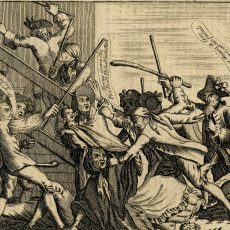Mar
1768
pontefract
Contested
GENERAL ELECTION
Poll book data from:
Holding: Nottingham University Manuscripts and Special Collections
Citation: GA 12259/13
Source: Information provided by Dr Edmund M. Green; Jeremy Gibson and Colin Rogers (eds.), Poll Books, 1696–1872: A Directory of Holdings in Great Britain (4th edn., Bury, 2008).
Timeline & Key Statistics
Contexts & Remarks
Date: Monday 21 Mar. 1768.
Poll book reference: Nottingham University Manuscripts and Special Collections, GA 12259/13.
The poll sheet forms part of the Monckton-Arundell, Viscounts of Galway, family papers of Serlby Hall. It is entitled, 'At the Poll for the Members of Parliament, taken at the Moothall in and for the Borough of Pontefract...'.
By 1768, the power dynamics in Pontefract had shifted. William Lowther, former MP for Pontefract, sold his 86 burgages to George Morton Pitt in 1741 for £9,600. The Monckton family had also acquired the burgages of the Bland, Dawnay, and Frank families for £6,000. Following Sir William Lowther's death in 1729, Lowther and Monckton (later the Lords Galway) nominated the borough's candidates. Following the 1741 sale, Pontefract was controlled by the interests of Galway and Pitt. On the death of Harriet Pitt in 1763, these burgages were sold to nabob John Walsh for £16,000.
Candidates: Viscount Galway (Whig), Sir Rowland Winn (Whig), and Henry Strachey (Whig)
While Robert Monckton's campaigns in Pontefract had been largely unsuccessful in the 1690s and early eighteenth century, his descendants had gained a considerable interest within the town by the 1730s. From 1734, the Whig John Monckton, 1st Viscount Galway, and a slew of Moncktons served as MP. In 1768, William Monckton, 2nd Viscount Galway, was a returning candidate, having been elected for the borough from 1747 to 1748 and again from 1754. He ran alongside Henry Strachey (John Walsh's candidate).
The Winn family also had a large interest in Pontefract, owning 40 of the town's burgages. Sir Rowland Winn was nominated by the independent burgesses due to the plan hatched by Walsh and Galway to involve faggot voters in the general election. A faggot voter satisfied the property qualification required to vote, though he only held the title to a subdivided portion of a larger property. Walsh and Galway also decided not to treat the borough or canvass its burgesses.
On polling day, Sir Rowland Winn was accompanied by his supporters 'in a riotous and tumultuous manner', who then occupied the town hall and prevented Galway and Walsh's supporters from casting their ballots. The mob used intimidation tactics to keep the polls open until Winn had a majority.
The election returned Galway and Winn, but Galway entered a petition with Walsh to contest the result. The election was declared void in November, and another writ was issued. Th leaders of the riot were convicted at the York assizes.
Poll Book
Below is a digitised version of the poll book for this election:



